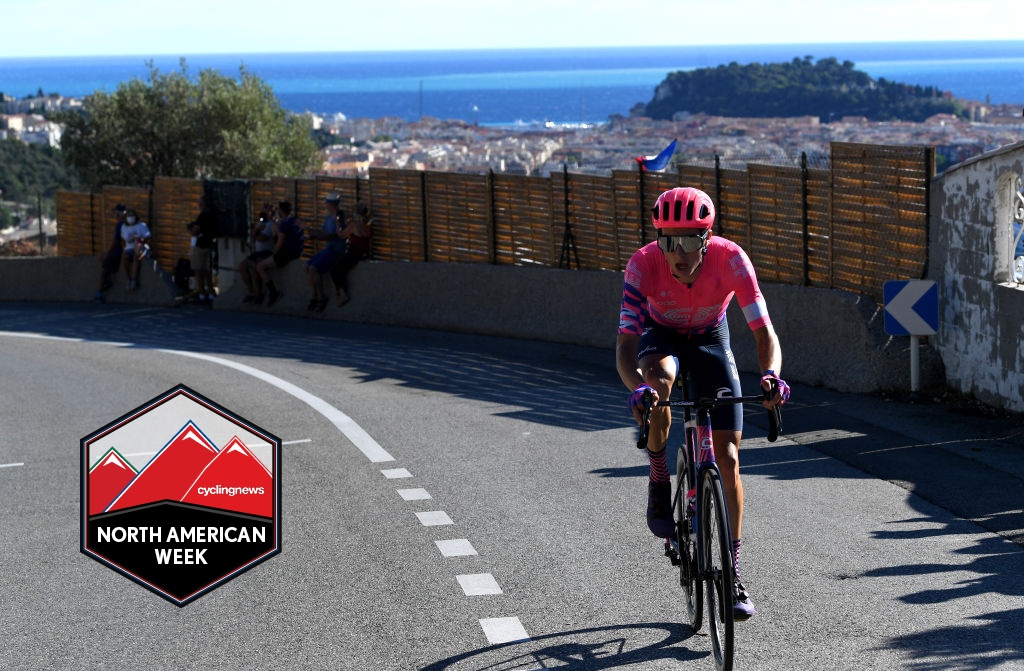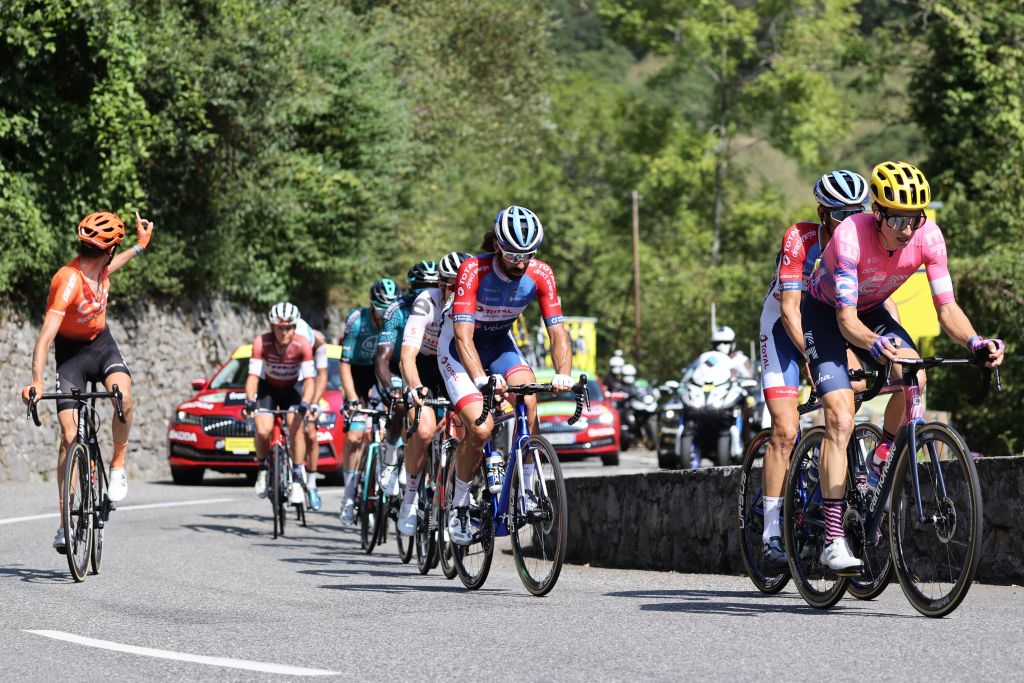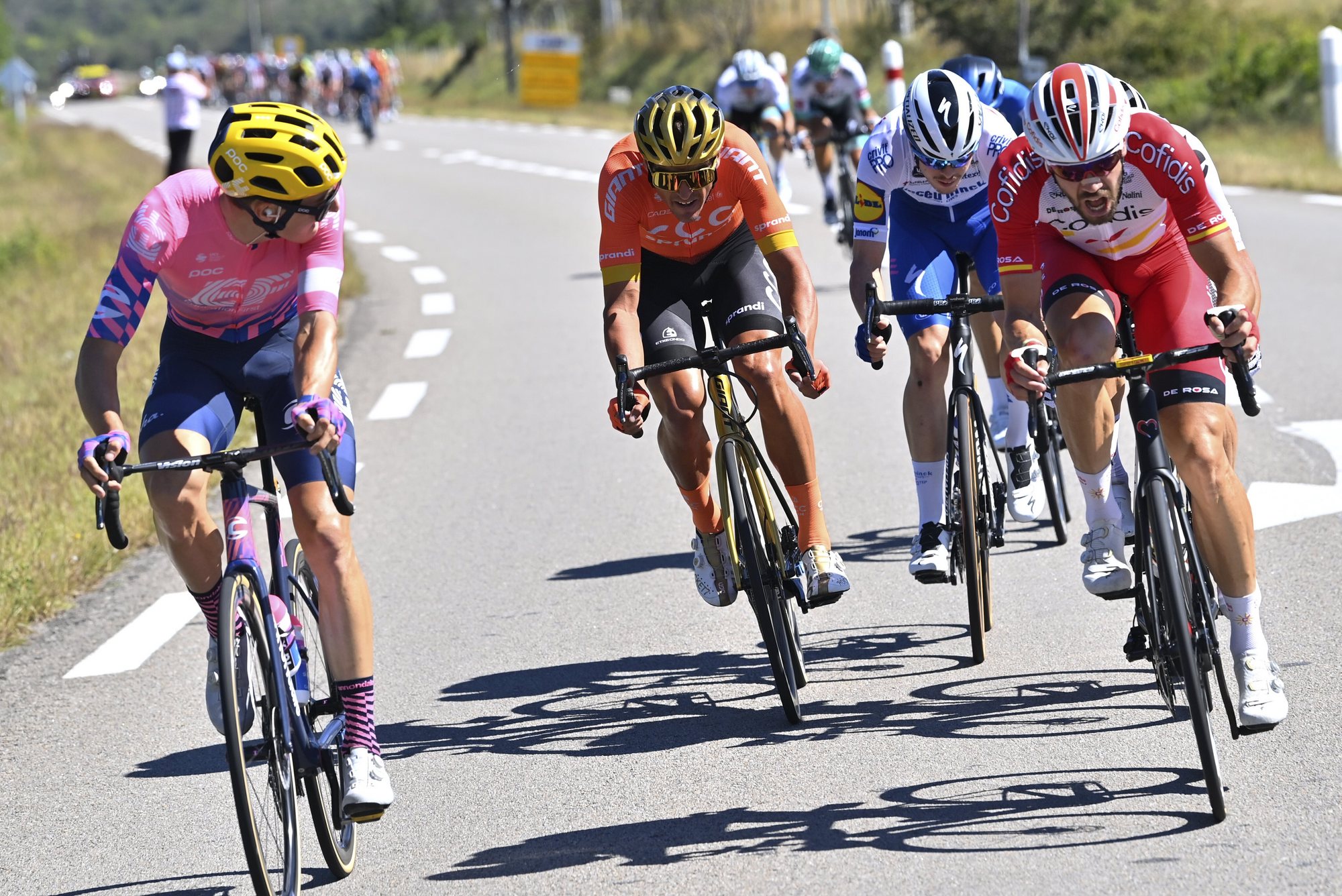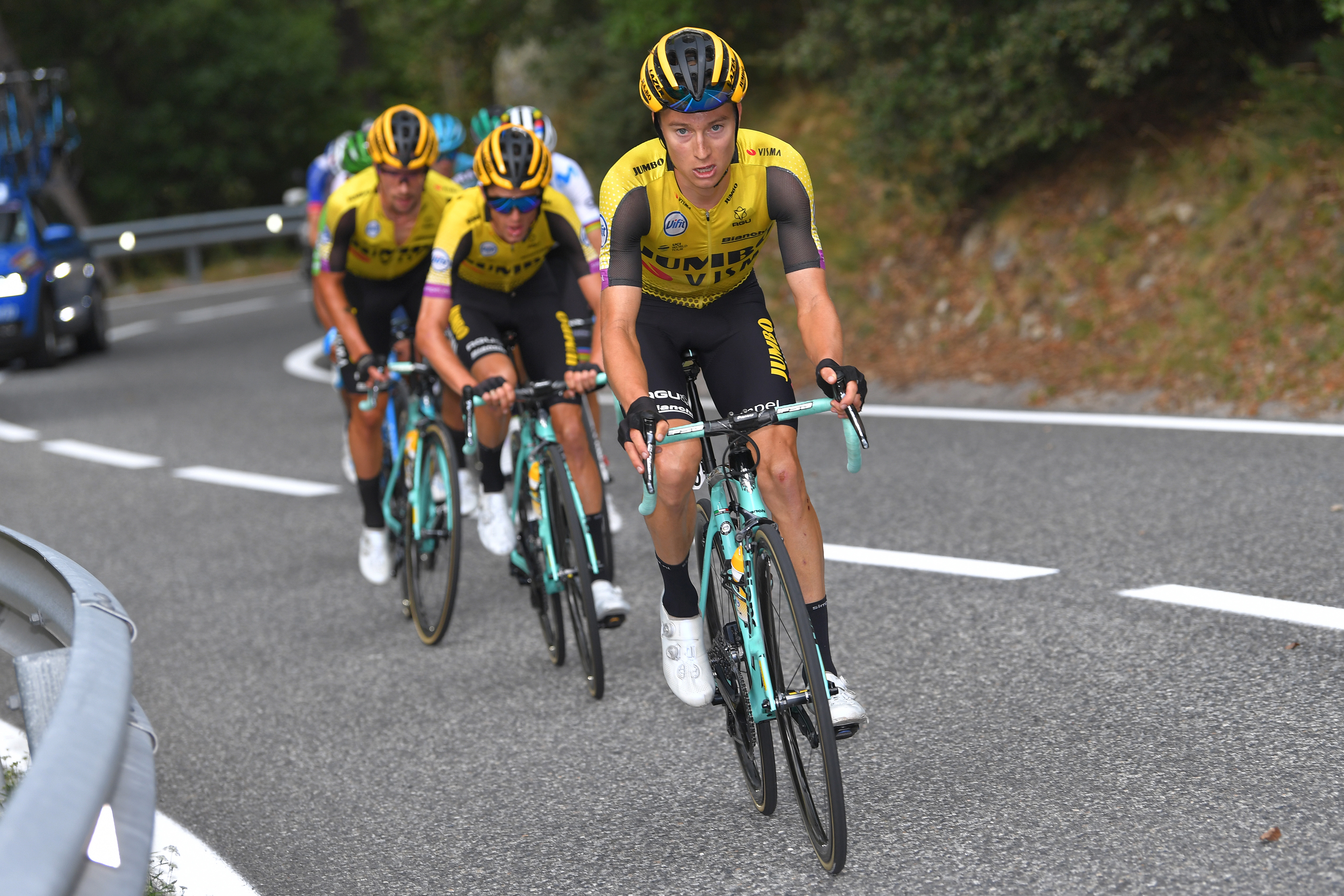All power to him: Neilson Powless
Procycling magazine interviews Neilson Powless

Neilson Powless won plaudits for his attacking, animated display at the Tour de France this year. The American tells Procycling magazine about making his debut and lessons he learned.
This article was taken from Procycling magazine, issue 275, December 2020.
Subscribe to Procycling magazine here.
During the 18th century, it was popular for young men to travel across Europe in search of art and culture, visiting countries like Italy and Germany. This adventure was known as a Grand Tour, but the resemblance between modern three-week stage races and the trips of young aristocratic men 200 years ago ends there. For the modern cyclist, the opportunities to take in the culture of the surrounding area as they’re spinning by at 40km/h while in the middle of three weeks of suffering are few and far between.
This doesn’t stop Neilson Powless. The young EF Pro Cycling rider explains: “During stages I’m kind of making mental notes and even writing down some notes of places I want to go visit again afterwards, because I rode through towns and I’m like, ‘That castle looked awesome, and that town looked really nice; this would be a nice weekend getaway at some point, I want to come back here.’”
He’s just casually, at his first Tour de France, aged 24, thinking about where he’d like to go on holiday. And it’s not like Powless was taking it easy. He was in the breakaway on stages 6, 8, 13, and 16, finishing fourth on stage 6 and then fifth on stage 8, and spending hundreds of kilometres in front of the peloton.
What stood out most, though, was his attacking panache. Like the host of other young stars at this year’s Tour de France - Marc Hirschi, Tadej Pogacar, Dani Martínez - Powless does not hold back when he’s racing. This was most notable on stage 6 to Mont Aigoual, when the young American kept attacking his breakaway companions before he was eventually caught and passed by Alexey Lutsenko. It was his 24th birthday, and why not spend it in the most powerful break of the Tour, alongside luminaries of the sport like Lutsenko, Greg Van Avermaet, Nicolas Roche and Edvald Boasson Hagen? Even getting in that move was impressive, let alone holding on for 170km, getting stuck into the race, and ending up fourth. The audacity of attacking from the front of the race, on a hard climb, out of the strongest break of the whole Tour, is what made Powless a star.
Get The Leadout Newsletter
The latest race content, interviews, features, reviews and expert buying guides, direct to your inbox!
He is honest about what went wrong, telling Procycling: “I think I was a little bit overconfident. I knew those guys were stronger than me on the flat roads, but I underestimated Lutsenko above everybody else. I knew he was a strong rider, but with the steepness of the climb, I thought
I would be a better climber, and I think I let my enthusiasm get the better of me on that stage. I was attacking like crazy, and that came back to hurt me.”

Powless has fought hard to make 2020 his breakout year. As well as dealing with a global pandemic, which brought racing to a halt (he went home to California), he has had to deal with moving to a new team, and recovering from glandular fever. To still perform well in the Tour after this seems remarkable. After racing in Australia at the beginning of the year, he was struck down by the illness, which meant he thought his season was over. In a way, the pause in racing came at the perfect time for Powless, meaning he had more time to recover before restarting racing.
“It was pretty tough trying to come back from because I was not sure if I was tired from training, or if I was having a relapse from mono. But the other day, I just kind of had to. It was a real mental battle of getting myself back to feeling confident with doing a solid training block,” he says.
After riding the Tour of Poland, Powless was one of the last picks for the Tour de France team, but his management will be glad that he went, as it was more than just an experience-building exercise.
The race was an eye-opening experience, especially compared to the Vuelta a España he rode last year. He explains: “Last year at the Vuelta people kept talking about how hard that grand tour was compared to others that they’d raced, just in terms of the power they were putting out, but this Tour has been way harder than the Vuelta was last year.”
Not that Powless thinks that the race being hard is a negative: “It has been a really hard Tour but I think it’s good. It’s a good thing when a grand tour is harder. The cream rises to the top.”
That cream included a 24 year-old from California on his debut Tour.

It has long been thought that Powless would be a central part of the coming generation, but his has not been the smooth ride to the top that some of his peers have experienced.
The mountain-top finish of stage 8 of the 2016 Tour de l’Avenir saw him win ahead of Pavel Sivakov, David Gaudu and Egan Bernal, some of the most promising stage racers of his age group. The next year, he almost repeated the feat, finishing second on the mountain-top finish on stage 9, behind Sivakov, but ahead of Bernal. So when he joined the WorldTour with LottoNL-Jumbo in 2017, after spending two years with Axeon Hagens-Berman (the U23 talent producing team), it seemed like things were only going to get better, as a promising racer joined the up-and-coming team in cycling. And yet it took Powless moving to EF this year to really unlock his potential.
As he says: “I don’t know if I would ever have had the experiences that I’ve had on this Tour with this team, on Jumbo. Just being able to race off the front and race aggressively and roll the dice and see what happens.”
While he admits that he learned a lot with the Dutch team, he didn’t fit in at the squad in the same way his compatriot Sepp Kuss has. Perhaps it was too regimented for Powless: you can hardly imagine him riding in the yellow train in the same way as Kuss, reining in his attacking instincts.
You get the sense that he fits in a lot more at EF, not only because it’s an American team, but because they seem prepared to give their riders the licence to attack and animate races, even when they have a rider going for general classification, as they did with Rigoberto Urán at this year’s Tour.
On stage 13, the team came together to power Martínez to a stage win, with Powless and Hugh Carthy both working in the breakaway to make it happen. Rarely would Jumbo-Visma or Ineos allow such a co-ordinated move happen when they still had GC ambitions alive and kicking.
EF is different. “Rigo is a great role model, he’s really relaxed and always tries to keep the energy positive. He just gets out there and tears it up, and that rubs off on everyone else just to relax, enjoy the moment and enjoy the race and ride as hard as you can,” Powless says.
It seems unfair that Powless’s first Tour has been the subdued version we saw this year, with the covid-19 pandemic limiting the crowds and the experience. However, the Tour is still the Tour, he explains down the phone from the race. “I can still feel the energy, and you can tell it’s a different race because of the attention you get from outside.
The media, and all the support messages I’ve been getting, is something I’ve never really experienced. In person it is a lot different to a normal year, and it is a bit disappointing that I don’t get the real first experience but it’s still everything that I could ask for.”
Powless has definitely got a lot of attention, both for his attacking prowess, and also as the first tribally recognised Native North American to race the Tour. Powless’s father, Jack, is half Oneida, one of the five Iroquois Nation tribes, making Neilson 25 per cent Oneida, the lowest level required for official tribal membership. When the news was first reported by VeloNews during the Tour, it got Powless noticed beyond traditional cycling media.
He tells Procycling: “A lot of indigenous news sources have been contacting me and talking to me about me and my family history, and asking about maybe doing some speaking on the reservation this winter. It has been really positive and quite nice really.
“They want any opportunity they can to have a sports person presenting themselves as a role model to the indigenous kids on reservation, just to inspire them. Also to show that you can do whatever you set yourself to do.”
Powless’s debut Tour has also sparked interest from others back home. “So many people that I knew growing up are reaching out and saying how proud of me they are, and how they love watching me. It’s great to realise the level that this event is at, when people that I haven’t talked to in 10 or 15 years reach out and say they saw me on NBC. A lot of the messages are from people who don’t even know anything about cycling but just happen to be watching the Tour de France because it’s on NBC, and they hear the commentators talking about me, and they’re like, ‘Oh my gosh I know that guy, or did know that guy.’”

Powless isn’t going to stop attacking off the front of the bunch, and he certainly proved that he has the capacity to animate races, including grand tour stages. It isn’t hard to imagine him being in the right position to win a stage at any of the grand tours, but his aim is set on a Tour stage.
“Right now, I’m just letting myself develop naturally and race whichever situation I find myself in. A dream of mine that I think will be achievable at some point is to win a stage of the Tour. It is bittersweet that I’ve missed out on two golden opportunities, but being a part of Dani’s [win] was nearly as good,” he says.
“I know that I have the physical capabilities to put myself in that position and then it’ll just be about making sure everything goes right on the day. Saving energy well enough, and being with the right guys and being strong enough on the right day.”
Powless isn’t alone in being an exciting, young attacking talent, and was part of a cohort at the Tour that included Martínez, Hirschi and Lennard Kämna, as well as slightly older riders like Søren Kragh Andersen (at the venerable age of 26) who lit up the race and were constant threats.
It’s something that Powless enjoys. “I like to see young guys crushing it because they’re super fun to watch and they’re super energetic,” he says. “It’s great to be young and killing it at these races because you’re a role model to guys in development teams or even in high school who could see like, wow, that’s actually not that far off.
“It makes pro cycling look exciting and fun. I think when it’s only 30-year-olds at the top of the sport, and they all look so serious all the time and never really crack a smile or never joke around or anything like that, then it can be pretty intimidating. It paints cycling in a much better light when you see riders winning who are young and enjoying it.”
Powless definitely isn’t serious all the time, and is at home in a team like EF, where he can keep enjoying himself, as well as sticking to his attacking instincts. It’s time to watch the young American continue to be a grand tourist and have fun on cycling’s biggest stage.
Adam Becket is Procycling magazine's staff writer. Take advantage of Procycling magazine's subscription offers and never miss an issue.
Procycling magazine: the best writing and photography from inside the world’s toughest sport. Pick up your copy now in all good newsagents and supermarkets, or get a Procycling subscription.
Adam Becket is the staff writer for Procycling magazine. Prior to covering the sport of cycling, he wrote about ecclesiastical matters for the Church Times and politics for Business Insider. He has degrees in history and journalism. A keen cyclist himself, Adam’s favourite race is the Tour of Flanders or Strade Bianche, and he can't wait to go to the Piazza del Campo for the end of the race one day.